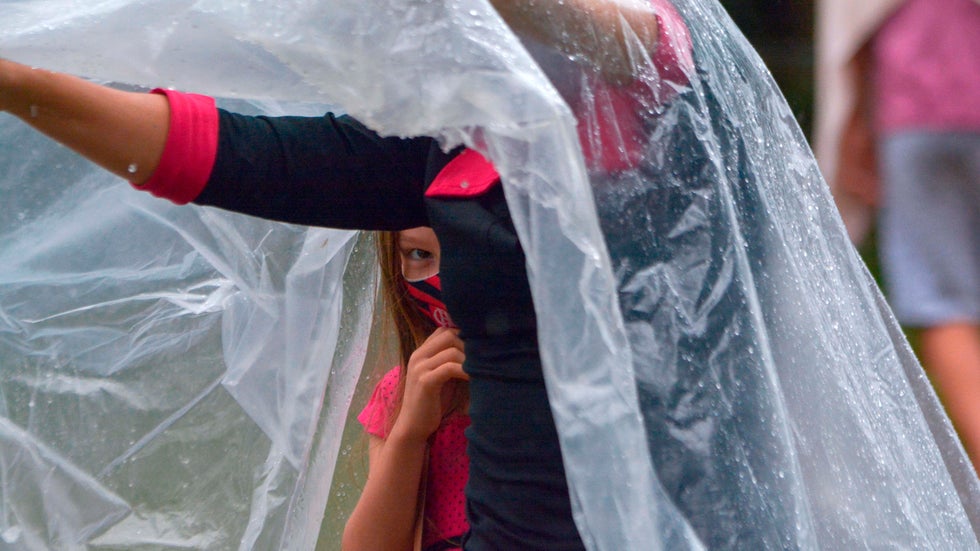Jan Wesner Childs
 A woman and a girl walk under a plastic sheet to protect themselves from the rain as they wait to receive medical assistance from members of the International Organization for Migration (IOM) in the riverside community of Bela Vista do Jaraqui, Manaus, Amazonas state, Brazil, on Jan. 18, 2021.
A woman and a girl walk under a plastic sheet to protect themselves from the rain as they wait to receive medical assistance from members of the International Organization for Migration (IOM) in the riverside community of Bela Vista do Jaraqui, Manaus, Amazonas state, Brazil, on Jan. 18, 2021.Extreme rainfall in the Amazon is connected to babies being born with lower birth weights, according to a new study.
The research, published Monday in the journal Nature Sustainability, analyzed data from more than 291,000 births in Amazonas State, Brazil, over an 11-year period, and then used satellite data to calculate how many weeks a pregnant woman was exposed to different amounts of rainfall.
“We used publicly available data on birth records to go ‘back in time’ to look at the relationship between climate extremes and birth weight," Erick Chacon-Montalvan of England's Lancaster University, lead author of the study, said in a news release.
The results showed that periods of extremely intense rainfall correlated with birth weights almost a half-pound lower on average, due to premature birth or fetal growth restriction, a condition in which a fetus is much smaller than it should be for its age.
(MORE: Shot to Prevent Lyme Disease Enters Human Trials)
The study also found that it didn't take extreme rain events to make a difference. Drier than seasonal averages, as well as babies being conceived in the rising-water season, also caused lower birth weights, although to a lesser extent.
The researchers said climate extremes, including flooding, can affect the health of mothers and unborn babies in several ways. For example, crops could fail, leading to food shortages and infectious diseases can be more common. River flooding exposes people to mosquito-borne diseases and causes additional stress and anxiety that can lead to premature birth.
SPONSORED: Paragon Sports sale happening now
Other research has pointed to climate change as the reason for more extreme weather in the Amazon. A study in 2018 showed that flooding in the Amazon had become five times more likely to happen than in previous decades, while another predicted that drought conditions would worsen in the future.
In recent weeks, more than 120,000 people have been displaced by flooding in the region.
The researchers who conducted the most recent study say low birth-weight can cause lifelong issues, including health problems, lower educational attainment and reduced income in adulthood.
And for babies born in the Amazon, that means another card stacked against them.
“Our study found climate extremes were adding another layer of disadvantage onto babies already facing a poor start in life," said Luke Parry, another Lancaster researcher who worked on the study.
The Weather Company’s primary journalistic mission is to report on breaking weather news, the environment and the importance of science to our lives. This story does not necessarily represent the position of our parent company, IBM.
The Weather Company’s primary journalistic mission is to report on breaking weather news, the environment and the importance of science to our lives. This story does not necessarily represent the position of our parent company, IBM.

No comments:
Post a Comment